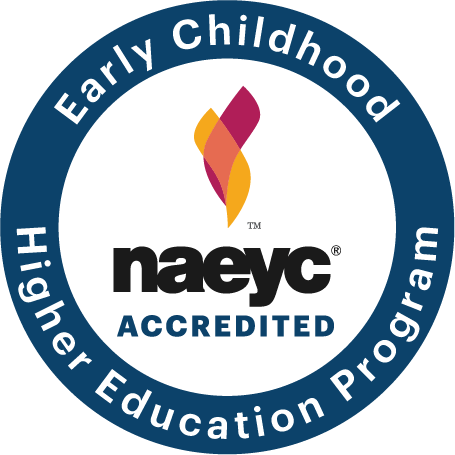Overview
Click on the tabs to learn more. Hint! Some tabs may be hidden. Click on the right green arrow to scroll.
NEW — Grants are Available for ECE Training!
Did you know there are now robust grants available for those seeking a degree or certificate in Early Childhood Education?
If you enroll in one of MCC’s ECE training programs, you are probably eligible for FREE tuition, including ECE and general education courses, books, fees and more.
Specific grant information can be found here:
To learn more about your grant eligibility and/or MCC’s Early Childhood Education training options contact Carrie Marshall.
Introduction to Early Childhood Education
The Early Childhood Education (ECE) program is designed to prepare individuals to work with children ages birth through 8 years in a variety of professional settings including but not limited to child care, public schools, early intervention, and Head Start. Graduates meet the New Hampshire Child Care Licensing (NHCCL) requirements for a lead teacher and center director and are eligible for many transfer opportunities including public school certification Pre-K through 3rd grade. The Associate of Applied Science degree program provides a combination of theory and practical experience related to child development, curriculum design, social & emotional competencies, family supports, and health and safety training. Graduates have approximately 300 hours of supervised experience with children of at least two different age levels (infant/toddler, preschool, primary grade).
In addition to the full degree, the program offers four certificates that provide training for different aspects of early childhood education: Early Childhood Lead Teacher Certificate, Infant/Toddler Lead Teacher Certificate, Special Education Certificate and Advanced Early Childhood Certificate.
Curriculum
Course Sequencing
Degree Program – First Year
ENGL110XM or ENGL110M
Total Credits: 4
English Elective (3 credits)
Total Credits: 3
MATH145M or MATH200M
Total Credits: 4
Practicum Elective
Total Credits: 3
Foreign Language/Humanities/Fine Arts Elective
Total Credits: 3
Degree Program – Second Year
Science Elective
Total Credits: 3 – 4
(Transfer students should select a 4 credit lab science)
Program Goal
The goal of the Early Childhood Education program is to provide students with the most current knowledge, skills, and to cultivate the dispositions that will enable them to become exemplary early childhood educators. To do so, we maintain high academic and professional expectations which adhere to the standards of quality set forth by the National Association for the Education of Young Children (NAEYC). Students will learn to be competent, reflective practitioners able to:
- Demonstrate an understanding of the early childhood profession and a commitment to its Code of Ethical Conduct
- Demonstrate understanding of the diverse developmental, cultural, and individual needs of all children
- Create high quality, inclusionary, positive, and nurturing learning environments and curriculum for young children
- Demonstrate skillful observation, documentation, and assessment of children’s progress
- Build and maintain positive, productive, and reciprocal relationships with children, families, colleagues and the community
- Serve as an advocate on behalf of young children and their families to improve the quality of early childhood programs and services
Program Outcomes
Students who graduate from this program will be able to:
- Compare, contrast, and discuss the diversity and breadth of learning and developmental theories, philosophies, and educational approaches from a historical and current perspective.
- Explain and demonstrate knowledge of the multiple interacting influences on children’s development and learning, and demonstrate the ability to support the physical, social, emotional, and cognitive development of young children from birth to age twelve, including those with unique developmental or learning needs.
- Establish and maintain safe, healthy, supportive, inclusionary, and culturally pluralistic learning environments for young children.
- Demonstrate an understanding of the goals, benefits, and purposes of assessment and the ability to utilize a variety of assessment and evaluation strategies and tools, including technology, effectively and ethically to observe and document children’s development and behavior in a positive and constructive manner, noting each child’s strengths and interests as well as needs.
- Design, implement and evaluate a meaningful, challenging, and developmentally appropriate curriculum that demonstrates a wide array of teaching practices reflecting the spectrum of content areas as well as intentionally taking into consideration the individual needs, learning styles, and interests of young children.
- Establish and maintain positive, productive relationships with families by respecting families’ choices and goals for children, communicating effectively and meaningfully with families, and using families as a primary source of information in planning to meet the needs of individual children.
- Establish and maintain positive, productive relationships with colleagues, work effectively as members of instructional teams, and communicate effectively with other professionals, agencies, and the larger community to support children’s development, learning, and well-being.
- Demonstrate an awareness of professional standards that will guide their practice and a commitment to the profession’s code of ethical conduct.
- Demonstrate reflective thinking and the ability to continually evaluate the effect of their choices and actions on others, seek out opportunities to grow professionally, and serve as an advocate for children, families, and the early childhood profession.
Accreditation
 The A.A.S. Early Childhood Education degree at Manchester Community College is accredited by the Commission on the Accreditation of Early Childhood Higher Education Programs of the National Association for the Education of Young Children. The current accreditation term runs from March 2017 through March 2024.
The A.A.S. Early Childhood Education degree at Manchester Community College is accredited by the Commission on the Accreditation of Early Childhood Higher Education Programs of the National Association for the Education of Young Children. The current accreditation term runs from March 2017 through March 2024.
Admission Requirements
In addition to college-wide admission requirements, ECE applicants:
- Are required to meet with an Admissions Counselor.
- Must provide a copy of health form required by the NH Child Development Bureau for childcare personnel indicating the individual is “recommended to work with young children” in order to participate in practicum experiences and to obtain a job in early childhood education.
- Must be free from criminal felony convictions and be able to complete a criminal records check through the NH Child Development Bureau, which includes fingerprinting, in order to participate in practicums, observations, and to obtain employment in early childhood education. The cost of this is approximately $20 and must be renewed every three years.
- Certificate and degree students must be available to complete day-time practicum hours.
Note: Any student enrolled in any ECE course is required to purchase a subscription to Taskstream, an online portfolio server each semester in which one or more ECE courses are taken. The student will develop an online portfolio highlighting work and competencies learned in their ECE courses. Due to program accreditation requirements, data will also be collected through the server (individuals will remain anonymous). Subscriptions can be purchased to cover one or more semesters through the college book store or directly from taskstream.com. Cost can be covered by financial aid.
Technical Standards
Technical Standards provide insight for students into the skills and abilities required to function successfully in the ECE program and eventually the profession. Applicants who do not feel they can meet these standards should contact the ECE program coordinator before applying. Students enrolling in the ECE program must have sufficient strength, stamina and motor coordination to:
- Stand for sustained periods of time, and walk, run, bend, sit on the floor and on child-size furniture to meet the child’s needs and accomplish tasks.
- Lift, move and transfer children, especially infants and toddlers.
In addition, students should have:
- Sufficient visual and hearing acuity to ensure a safe environment and the ability to respond quickly in an emergency.
- Sufficient verbal ability to express and exchange information and ideas and to interpret instructions to children, co-workers and parents.
- The ability to work with frequent interruptions, to respond appropriately in unexpected situations, and to cope with extreme variations in workload and stress levels.
Early Childhood Education Transfer Credit Policy
In addition to MCC transfer credit policies, transfer of courses in early childhood education more than 10 years old will be evaluated by the Department Chair on an individual basis.
Early Childhood Education Practicum
ECE students can earn practicum hours through the MCC Child Development Center, which serves as the program’s lab school.
Some students have had quality and lengthy work or training experiences and may wish to test out of the freshman practicum experience. Students must first meet with their academic advisor and provide documentation to indicate their knowledge and skills. Testing out may include exams, projects, lesson plans, essays, journal entries and other documentation that meets course requirements. Students seeking to test out of Early Childhood Education practicum must have completed a minimum of nine Early Childhood Education credits with a minimum of a 3.0 GPA.
Advanced Early Childhood Certificate
Designed for students who already hold an associate or bachelor’s degree, or 60 college credits from an accredited college in another field who wish to become center director qualified in NH (with work experience).
Early Childhood Special Education Certificate
Teachers and paraprofessionals are increasingly working in inclusive settings and are responsible for meeting students’ Individualized Educational Plans (IEP). They are members of the IEP or IFSP teams and need adequate training to effectively work with children with unique learning characteristics. This certificate trains individuals interested in working as paraprofessionals in Early Intervention or Early Childhood Special Education and Inclusionary classrooms.
Early Childhood Lead Teacher Certificate
This certificate will enable students to qualify as lead teachers in an early childhood program according to NH state child care program licensing rules. All courses in this program transfer directly into the associate degree program for students who wish to continue their education.
Academics
of MCC classes have 19 or fewer students.


